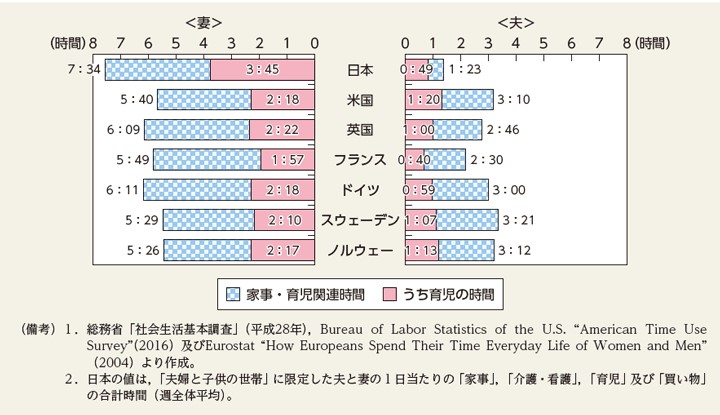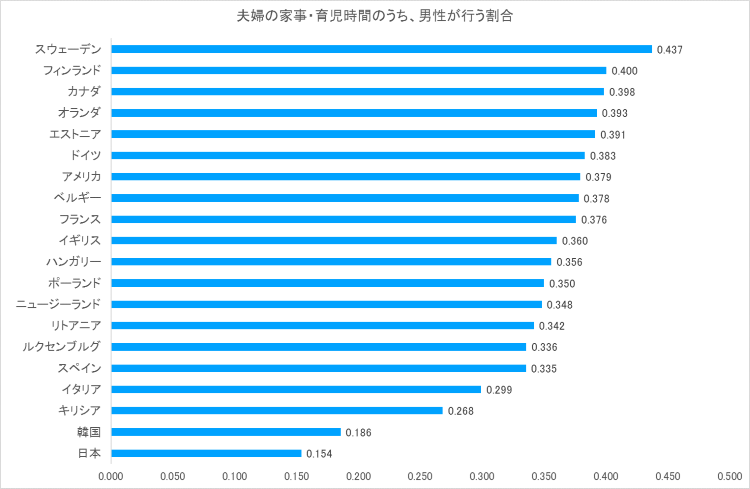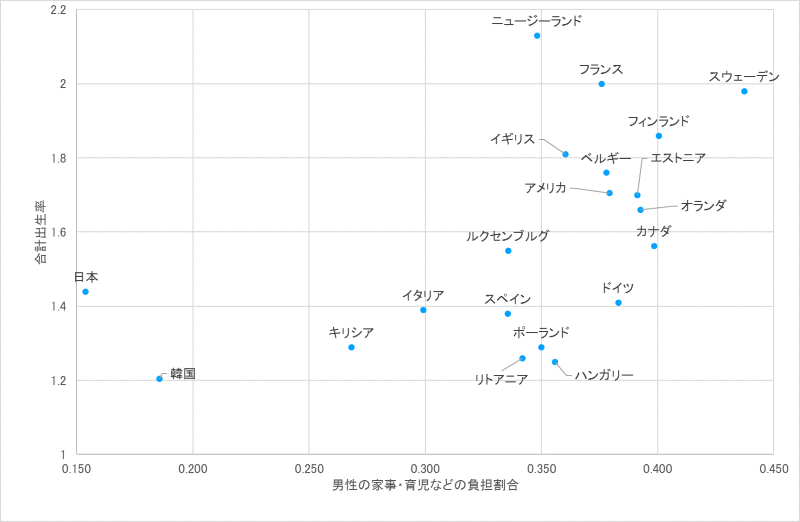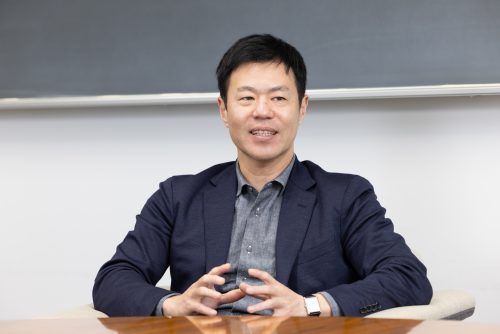 Although the percentage of men taking childcare leave has been increasing every year, it is still low compared to that of women. It is an essential theme for the future of society that men take childcare leave and actively participate in housework and childcare, i.e., “advance into the home. Shintaro Yamaguchi, a professor at the University of Tokyo’s Graduate School of Economics and Management, who studies the “economics of the family” in relation to marriage, childbirth, and child rearing, explains the impact of men’s participation in housework and childcare on the family and society as a whole, including the situation in other countries.
Although the percentage of men taking childcare leave has been increasing every year, it is still low compared to that of women. It is an essential theme for the future of society that men take childcare leave and actively participate in housework and childcare, i.e., “advance into the home. Shintaro Yamaguchi, a professor at the University of Tokyo’s Graduate School of Economics and Management, who studies the “economics of the family” in relation to marriage, childbirth, and child rearing, explains the impact of men’s participation in housework and childcare on the family and society as a whole, including the situation in other countries.
Japan has few men’s hours for housework and childcare by international standards
Do you know how much difference there is between the amount of time men and women spend on housework and childcare? Here are some statistics based on national surveys and international data that allow us to compare this internationally, showing the average daily time spent by married couples with children under 6 years old on housework and childcare.
Housework and childcare-related time (per day, international comparison) for married couples with children under 6 years old

*Source: White Paper on Gender Equality (Summary Version), from the 2008 edition.
Of a couple’s combined time for housework and childcare, in Japan, the wife’s share accounts for about 85%, while the husband’s share is about 15%. The difference between women and men is more than five times as great.
In contrast, as shown in the graph below, in the U.S. and European countries, husbands bear about 30-40% of the burden, a difference of two to three times. In all countries, women generally perform more housework and childcare than men, but the gender gap in housework and childcare is particularly large in Japan.
Percentage of men’s participation in housework and childcare in each country

*Created by: Shintaro Yamaguchi (The University of Tokyo)
Data source: OECD Gender Data Portal (2021)
Note: High-income countries (as defined by the World Bank) are covered.
Narrowing the gender gap in the burden of housework and childcare would have a positive impact on the birth rate.
Japan’s female employment rate (the percentage of female workers in the population aged 15 and over) is high, at more than 50%, and is not significantly different from that of other countries. However, the percentage of women working full time or in executive positions is still lower than in other countries. One of the reasons for this is the heavy burden of housework and childcare that they bear in the home. If men take childcare leave and the gender gap in the burden of housework and childcare is reduced, women will be able to exert more power outside the home.
European studies also show that fertility rates are higher in countries that are more gender-neutral (i.e., not bound by gender differences).
Correlation between fertility rates and the share of men’s burden in housework, childcare, etc.

*Created by: Shintaro Yamaguchi (The University of Tokyo)
Data source: OECD Gender Data Portal (2021) and World Bank Open Data (2021)
Note: High-income countries (as defined by the World Bank) are covered.
The reason for this is said to be that when men bear a high percentage of the child-rearing burden, women naturally want to have and raise another child.
In countries in Europe with low fertility rates, many husbands want to have children, but their wives do not want any more children. When we delved into the reasons for this, we found a situation where the wife is burdened with housework and child-rearing, and she feels that having another child will add even more burden only on her. Therefore, lightening the burden of housework and childcare for women is expected to have a positive impact on fertility in the long run.
Men are happier and their lives change when they take parental leave.
In various happiness studies, it has been noted that time spent with family is linked to feelings of happiness. In other words, men taking parental leave to spend more time with their children is itself often linked to their own sense of happiness.
In Japan, only about 14% of men take childcare leave, and the length of leave is about 5 days. Finland, Sweden, Germany, Spain, and Australia, for example, are longer than Japan, with one to two months being the norm. Some people in the general public are skeptical, asking, “What’s the point of taking a month or so of childcare leave?” Some people are skeptical about the meaning of a one-month childcare leave. However, research has shown that even a short period of childcare leave can have a life-changing impact on men.
In Quebec, Canada, we looked at the lifestyle of men who took an average of five weeks of childcare leave three years later, and found that the average daily hours of housework and childcare for men had increased by 20%. If childcare leave can be used as a starting point for subsequent lifestyle changes, then even short periods of childcare leave can be very significant. Increasing the number of men who have the same experience would be an important step toward promoting social change.
Men’s “entry into the home” also affects children’s view of gender
It is said that children who grow up seeing fathers raising children and mothers working outside the home naturally learn about gender-neutral attitudes. Such children are also found to be able to participate in housework and childcare quite naturally when they become parents, and to be somewhat free from gender bias (unconscious assumptions about gender roles).
Recently, there is a great increase in the number of people who feel constrained by the mold of “men should be this way and women should be that way. It is thought that the increase in the number of children who have ideas that do not have a gender-role consciousness through the “advancement of men into the home” will lead to the creation of a more comfortable society for many people.

Promoting male parental leave has many benefits for companies
I believe that an employee taking childcare leave is a good opportunity to break away from the “only that person can understand that job” mentality that has become the norm in the business. Even if it is not childcare leave, people sometimes need to take time off from work due to illness or injury. It is very important for company management to always have someone else available to cover for them, no matter who is absent.
For example, a mid-level employee who has had difficulty delegating tasks to subordinates, such as “It’s faster if I do it myself,” will be able to transfer authority and enhance his/her managerial skills by taking childcare leave and taking time away from work.
It has also been found that when a supervisor takes childcare leave, the rate of his/her subordinates taking childcare leave is 2.5 times higher than when a colleague takes it in the same workplace.
And whether or not a company is comfortable taking childcare leave can affect its advantage or disadvantage in the hiring market. Today, 80 to 90% of men of child-rearing age want to take childcare leave. A well-developed childcare leave system is not only advantageous for recruitment, but also effective for retaining excellent human resources within the company.
It is important for company top management to promote the project with strong determination.
In Denmark, a study was conducted on companies with less than 25 employees to see how company performance changes after employees, not just men, take parental leave. The results showed that even if someone leaves for childcare leave, there is basically no impact on operations or performance, and the company can get by with others covering for them or hiring someone temporarily. What we can say from this is that it is quite possible for small and medium-sized Japanese companies to promote the use of childcare leave if they devise the allocation of personnel and work assignments.
A common characteristic of successful Japanese companies is that their top management is very determined in their efforts. Under strong leadership, the key to success is ingenuity on the management part, such as promoting DX and reviewing the work system.
The couple shares both hardships and joys together! A good marriage is a great asset to the family.
As a parent, I personally feel that having a child is the happiest event in my life. Men who have never raised a child before may feel a lot of confusion. However, with the first child, even the mother is a beginner at child rearing. While the child is young, there are many challenges, and childcare leave is a valuable opportunity for couples to share the difficulties and joys of childrearing during this difficult time. If you and your partner can work together to get through the housework and childcare and build a good marital relationship, it will be a great asset to your family. It will last for decades. We hope that as many men as possible will experience the wonder of child-rearing.

Shintaro Yamaguchi / Professor, Graduate School of Economics, The University of Tokyo
D. in Economics from the University of Wisconsin, U.S.A., in 2006. After working as an assistant professor and associate professor at McMaster University, Canada, and as an associate professor at the Graduate School of Economics, University of Tokyo, he will assume his current position in 2019. He specializes in “family economics,” which uses economic methods to study marriage, childbirth, and child rearing, and “labor economics,” which analyzes the labor market. He is the author of “‘Family Happiness’ Economics” (Kobunsha Shinsho), which won the 41st Suntory Academic Prize and was selected as No. 1 in Weekly Diamond’s Best Economic Books 2019.











